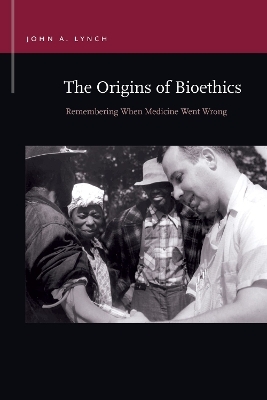
The Origins of Bioethics
Remembering When Medicine Went Wrong
Seiten
2019
Michigan State University Press (Verlag)
978-1-61186-341-3 (ISBN)
Michigan State University Press (Verlag)
978-1-61186-341-3 (ISBN)
Charts this tension between bioethical memory and minimal remembrance across three cases - the Tuskegee Syphilis Study, the Willowbrook Hepatitis Study, and the Cincinnati Whole Body Radiation Study - that highlight the shift from robust bioethical memory to minimal remembrance to forgetting.
The Origins of Bioethics argues that what we remember from the history of medicine and how we remember it are consequential for the identities of doctors, researchers, and patients in the present day. Remembering when medicine went wrong calls people to account for the injustices inflicted on vulnerable communities across the twentieth century in the name of medicine, but the very groups empowered to create memorials to these events often have a vested interest in minimizing their culpability for them. Sometimes these groups bury this past and forget events when medical research harmed those it was supposed to help.
call to bioethical memory then conflicts with a desire for “minimal remembrance” on the part of institutions and governments. The Origins of Bioethics charts this tension between bioethical memory and minimal remembrance across three cases - the Tuskegee Syphilis Study, the Willowbrook Hepatitis Study, and the Cincinnati Whole Body Radiation Study - that highlight the shift from robust bioethical memory to minimal remembrance to forgetting.
The Origins of Bioethics argues that what we remember from the history of medicine and how we remember it are consequential for the identities of doctors, researchers, and patients in the present day. Remembering when medicine went wrong calls people to account for the injustices inflicted on vulnerable communities across the twentieth century in the name of medicine, but the very groups empowered to create memorials to these events often have a vested interest in minimizing their culpability for them. Sometimes these groups bury this past and forget events when medical research harmed those it was supposed to help.
call to bioethical memory then conflicts with a desire for “minimal remembrance” on the part of institutions and governments. The Origins of Bioethics charts this tension between bioethical memory and minimal remembrance across three cases - the Tuskegee Syphilis Study, the Willowbrook Hepatitis Study, and the Cincinnati Whole Body Radiation Study - that highlight the shift from robust bioethical memory to minimal remembrance to forgetting.
John A. Lynch is Professor and Graduate Director in the Department of Communication at the University of Cincinnati. He was previously the clinical research ethicist at the Center for Clinical and Translational Science and Training at UC's College of Medicine. He is the author of What Are Stem Cells? Definitions at the Intersection of Science and Politics, which received the 2016 Distinguished Book Award from the National Communication Association's Health Communication Division, and Prepare to Believe: The Creation Museum as Embodied Conversion Narrative, which received the Association for the Rhetoric of Science, Technology, and Medicine's 2014 Article of the Year Award.
| Erscheinungsdatum | 13.09.2019 |
|---|---|
| Reihe/Serie | Rhetoric & Public Affairs |
| Verlagsort | East Lansing, MI |
| Sprache | englisch |
| Maße | 152 x 229 mm |
| Gewicht | 340 g |
| Themenwelt | Geschichte ► Allgemeine Geschichte ► Neuzeit (bis 1918) |
| Geisteswissenschaften ► Geschichte ► Regional- / Ländergeschichte | |
| Geisteswissenschaften ► Sprach- / Literaturwissenschaft ► Sprachwissenschaft | |
| Medizin / Pharmazie ► Medizinische Fachgebiete ► Medizinethik | |
| Studium ► Querschnittsbereiche ► Geschichte / Ethik der Medizin | |
| ISBN-10 | 1-61186-341-4 / 1611863414 |
| ISBN-13 | 978-1-61186-341-3 / 9781611863413 |
| Zustand | Neuware |
| Haben Sie eine Frage zum Produkt? |
Mehr entdecken
aus dem Bereich
aus dem Bereich
Europa 1848/49 und der Kampf für eine neue Welt
Buch | Hardcover (2023)
DVA (Verlag)
48,00 €
Giordano Bruno - ein ketzerisches Leben
Buch | Hardcover (2024)
C.H.Beck (Verlag)
29,90 €


